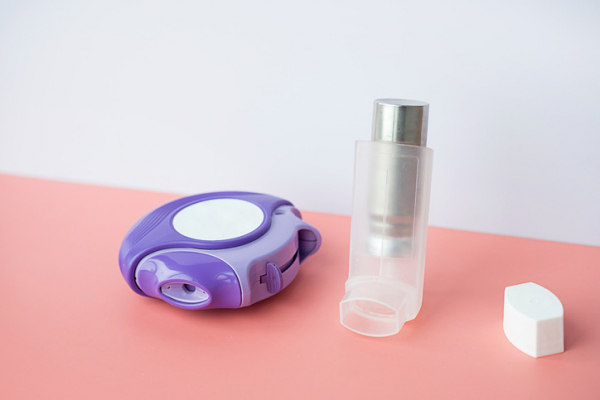
What happens when a widely used medicine is no longer available at pharmacies across the US? Until recently, Flovent (fluticasone) inhalers were frequently prescribed to help control asthma. If you or your child relied on these products, you may be scrambling to find medicines that will help you stay healthy without breaking the bank.
What’s essential to know, and what questions should you ask your health care provider? We checked in with Dr. William B. Feldman, a physician in the Division of Pulmonary and Critical Care Medicine at Harvard-affiliated Brigham and Women’s Hospital to get answers.
Which medicines are discontinued?
In January, GlaxoSmithKline stopped producing Flovent, which was available as a prescription metered-dose inhaler (Flovent HFA) and a dry powder inhaler (Flovent Diskus).
Both contain fluticasone, a steroid. Fluticasone reduces inflammation and swelling in the airways. Both types of inhalers are FDA-approved to help prevent asthma attacks.
However, children under age 5 and adults with particularly poor lung function may not be able to use a dry powder inhaler. They may lack the lung power necessary to breathe in deeply enough to pull the medicine into their airways, Dr. Feldman explains. A metered-dose inhaler could be the best choice for them.
Now that Flovent is discontinued, is a generic product available?
Yes, the drug manufacturer has licensed an authorized generic of both Flovent products: the metered-dose inhaler and the dry powder inhaler.
However, insurance coverage may not pay for the authorized generic because it may cost an insurer more than some other branded medicines. So, you may need to switch to another brand to stay healthy. Call your insurance company to check.
What are your alternatives?
This is a good chance for you and your doctor to review your asthma treatment plan. It may be a good time to make changes.
If you had been using Flovent daily for symptom control, your doctor may recommend:
- Trying an inhaled steroid similar to Flovent. Many types of steroids will work, including beclomethasone (Qvar RediHaler), budesonide (Pulmicort Flexhaler), ciclesonide (Alvesco), and mometasone (Asmanex Twisthaler, Asmanex HFA). “These products use different molecules to do the same job as fluticasone,” says Dr. Feldman.
- Switching to a combination inhaler. New studies suggest this approach may help many people who use Flovent daily for symptom control and only use a short-acting medicine to open airways when an asthma flare occurs (see here and here). If you have intermittent asthma symptoms, talk with your provider about whether you could use a combination inhaler when you start to wheeze or have shortness of breath. This combines a medicine called formoterol with a steroid. Symbicort provides this combination in one inhaler. Although not yet approved by the FDA for this specific use, it is approved in many other countries.
What else do asthma specialists advise people to do?
If your insurance covers the authorized generic, this may be a good choice because you already know how to use the product. But what if insurance won’t cover this?
“Any other inhaled steroid should work for most — but not all — people,” says Dr. Feldman. “There are brand-name metered-dose and dry powder inhalers available, such as those mentioned above.”
Here’s what else to know and do
- Discuss whether it’s safe to switch medicines or type of device. For many people, the answer will be yes. But if your health care provider believes that a metered-dose inhaler is the best choice due to age or poor lung function, ask your insurance company for a formulary exception to cover the authorized generic fluticasone or another metered-dose inhaler. Ask your provider to make the same request.
- If you have a child under 5, you and your doctor should also ask your insurance company for a formulary exception to cover a metered-dose inhaler with a steroid.
- For anyone who needs to switch brands, your new inhaler may look and feel different and may require a new technique when you use it to get the full benefit of the medicine. “When folks switch from one type of inhaler to another, it’s very important to get proper education, ideally from their prescriber. But you can also do this online to understand how to properly use this new product,” says Dr. Feldman.
If you do switch, ask your health care provider to show you how to use the new inhaler in an in-person or virtual visit. If that’s not possible, check your technique by watching these videos created by National Jewish Health, a leading US hospital for respiratory care.
What if you’re not feeling as good on a new asthma medicine?
If you’ve switched and notice worsening symptoms or more asthma attacks, contact your health care provider, Dr. Feldman advises. “They should make sure this isn’t due to improper technique with the new device. It may not be, but it’s important to check and to keep your doctor aware of changes like these.”
Is there a difference between an authorized generic and independent generic medicines?
“With an authorized generic, the brand-name company produces the generic or licenses another company to do that. It’s the exact same medicine as the original brand-name drug. It just doesn’t have the label,” says Dr. Feldman.
Independent generics encourage price competition if several companies make them. “With authorized generics, you don’t see those price decreases to the same extent, because you typically just have one product and it’s totally controlled by the branded company,” he adds.
What if you don’t have insurance, or insurance won’t cover a medicine you need?
“These inhalers have extraordinarily high list prices — $200, $300, $400 per month for the product,” notes Dr. Feldman. Manufacturers negotiate rebates with insurers that may substantially lower the price for an insurance plan.
If you don’t have insurance, you won’t get that lower price. So, it’s worth checking prices for all options: you may find the authorized generic will cost you less than other brand-name inhalers.
About the Author

Francesca Coltrera, Editor, Harvard Health Blog
Francesca Coltrera is editor of the Harvard Health Blog, and a senior content writer and editor for Harvard Health Publishing. She is an award-winning medical writer and co-author of Living Through Breast Cancer and The Breast … See Full Bio View all posts by Francesca Coltrera
About the Reviewer

Howard E. LeWine, MD, Chief Medical Editor, Harvard Health Publishing
Dr. Howard LeWine is a practicing internist at Brigham and Women’s Hospital in Boston, Chief Medical Editor at Harvard Health Publishing, and editor in chief of Harvard Men’s Health Watch. See Full Bio View all posts by Howard E. LeWine, MD
